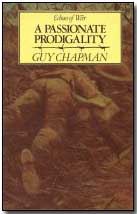Prose & Poetry - Guy Chapman
 Guy Patterson
Chapman (1889-1972), editor, publisher, professor of history and author, was
born in London and educated at Oxford University, where he trained to become
a lawyer.
Guy Patterson
Chapman (1889-1972), editor, publisher, professor of history and author, was
born in London and educated at Oxford University, where he trained to become
a lawyer.
Following the declaration of war in 1914, Chapman joined the Royal Fusiliers as an adjutant and was sent to the Western Front in August 1915.
Chapman survived the Battle of Arras in 1917 but was badly affected by a mustard gas attack. Following treatment for this he returned to the Western Front, remaining until the armistice was signed on 11 November 1918.
Upon discharge from the army, Chapman worked as an editor for numerous publishing houses (including his own) from 1920, before becoming a university lecturer, eventually being appointed Professor of Modern History at the University of Leeds.
He published numerous books, including his classic wartime memoirs, A Passionate Prodigality: Fragments of Autobiography (1933), which gives an excellent understanding of what life was like in the trenches for the common soldier.
A balanced and useful memoir, Chapman's view of the war as represented in his memoirs was an ambivalent one. The author of A Passionate Prodigality hated war, but also felt a strange affection for it. Chapman wrote of "the enormous fascination of war, the repulsion and attraction, the sharpening of awareness... an apprehension which was not fear - a quickening rather." He also edited a collection of war prose, Vain Glory (1937).
Chapman's interest in history led to the publication, in 1955, of the widely respected The Dreyfus Case: A Reassessment.
Having served in two world wars during his lifetime, Guy Chapman died in 1972. His wife, the novelist Storm Jameson (1891-1983), posthumously published a selection of Chapman's autobiographical work under the title A Kind of Survivor.
A "Bangalore Torpedo" was an explosive tube used to clear a path through a wire entanglement.
- Did you know?
